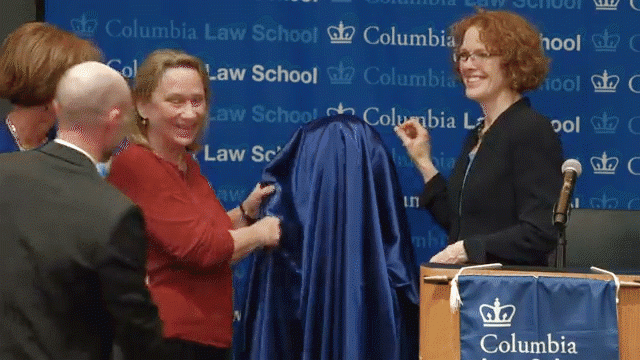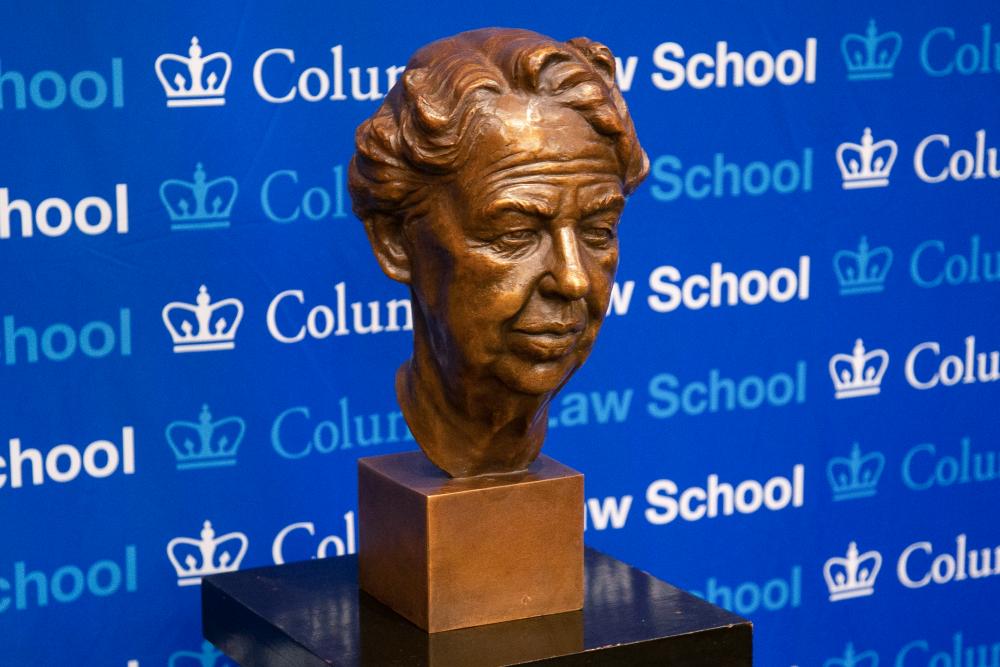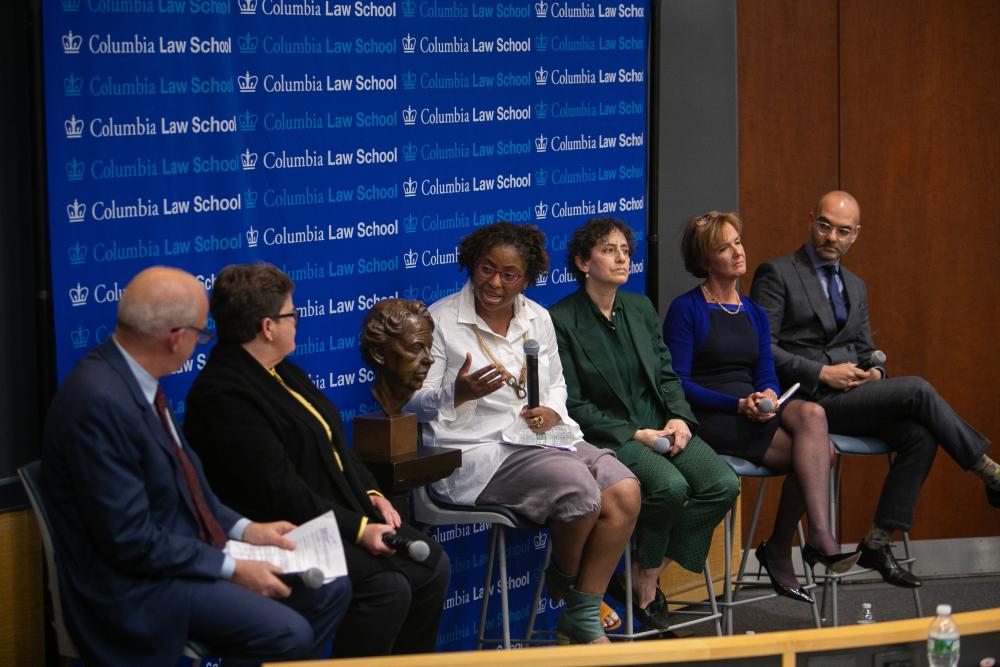Columbia Law Unveils Eleanor Roosevelt Bust
The Human Rights Institute remembers the advocate for her leadership in drafting the Universal Declaration of Human Rights on the document’s 70th anniversary.
Eleanor Roosevelt was ahead of her time in championing human rights around the world, and those values still need advocates today, says Laura Roosevelt, Roosevelt’s granddaughter. Laura Roosevelt came to Columbia Law School to unveil a bust of the famous matriarch at an April 3 event commemorating the 70th anniversary of the Universal Declaration of Human Rights. Eleanor Roosevelt chaired the commission that drafted the document, which was adopted by the United Nations General Assembly in 1948.
“We can take inspiration from the fact that someone like Eleanor Roosevelt surmounted everything and devoted her life to making the world a better place for all human beings,” Laura Roosevelt said.
The Law School is a fitting location for the commemorative bust, said Roosevelt, because Eleanor Roosevelt was born, lived much of her life, and died in New York, and because her husband, President Franklin Delano Roosevelt, attended Columbia Law School as a student. (Eleanor Roosevelt’s uncle, President Theodore Roosevelt, also studied at Columbia Law School; both former presidents were awarded posthumous degrees in 2008.)
Laura Roosevelt was joined in the unveiling by Gillian Lester, Dean and the Lucy G. Moses Professor of Law, and Sarah Cleveland, the Louis Henkin Professor of Human and Constitutional Rights and faculty co-director of the Law School’s Human Rights Institute, which sponsored the event as part of its 20th anniversary celebration. Artist Marie Šeborová created the bust, which was gifted by Art for Amnesty founder Bill Shipsey and the Evelyn Sharp Foundation. It will be on display on the eighth floor of Jerome Greene Hall, in close proximity to a portrait of Franklin Delano Roosevelt. Other commemorative busts of Roosevelt have been unveiled in France, Italy, the Netherlands, and Slovenia; this is the first on display in the United States.
An Impassioned Debate
Dean Lester said the Universal Declaration of Human Rights continues to serve as a measure for the progress nations have made and the work that remains to ensure people’s basic rights are respected around the world.
“The declaration, of course, was [Roosevelt’s] crowning achievement, and the document and the human rights system it spawned have no doubt withstood the test of time,” said Dean Lester. “Eleanor Roosevelt awakened the collective conscience in the U.S., as well as the world. But, perhaps even more than that, she was an example of the kind of change that can be brought about through hard work and dedication to a cause.”
The unveiling was followed by a lively, and at times contentious, debate about the impact and relevance of the Universal Declaration of Human Rights in the world today. New York Times foreign affairs columnist Roger Cohen moderated the panel discussion. At the outset, he pointed to the threat that rising xenophobia and nationalism pose to the document’s values, in the United States and around the world.
Columbia Law Lecturer A. Kayum Ahmed, former CEO of the South African Human Rights Commission, cited climate change as a reason the declaration—and the entire human rights system—may no longer be sufficient. He argued for a less human-centric framework that accounts for the needs of the planet as a whole.
In response, Cleveland agreed that the understanding of human rights was “quite constrained” at the time of the declaration’s adoption. But, she added, the document’s language was “sufficiently open,” allowing its use over time to recognize the rights of women and the LGBTQI community, among other groups.
“This has required effort and radical movement after radical movement,” she acknowledged, adding later that even greater effort may be required now. “We’re seeing a challenge to the institutions that were created to establish peace and protect rights after the Second World War in a way that we’ve never seen before.”
Roosevelt Did the ‘Rough Work’
Roosevelt understood the hard work of ensuring respect for human rights on the ground, said panelist Allida M. Black, founder of The Eleanor Roosevelt Papers Project at George Washington University. Black noted that Roosevelt was “the most hated and the most admired” woman in the United States at the time of the declaration’s adoption and survived several assassination attempts.
“This was rough work,” Black said, going on to paraphrase a famous quote of Roosevelt’s: “Without concerted citizen action to uphold [human rights] close to home, we shall look in vain for progress in the larger world.”
During the discussion, Lynn Freedman, director of the Averting Maternal Death and Disability Project at Columbia University’s Mailman School of Public Health, spoke about the declaration’s role in ensuring that health is seen as a human right. She noted that maternal mortality of African-American women in New York is 12 times that of white women, emphasizing that much work remains.
Tracy Robinson, a former president of the Inter-American Commission on Human Rights, spoke passionately about positive developments that happen without fanfare: for example, Caribbean states that have abolished the death penalty in practice.
Professor Suzanne Goldberg, Columbia University’s executive vice president of University Life and the Herbert and Doris Wechsler Clinical Professor of Law, and Robert Klitzman, director of Columbia University’s Masters of Bioethics program, made opening remarks at the event.
“Our job, as I think of it, is to bear witness and . . . to think, to strategize, and to act in ways large and small that continue to make the Universal Declaration of Human Rights not only an aspirational, visionary document, but also a reality on the ground,” Goldberg said.
Columbia Law School’s contributions to the development of human rights law date back to the origins of the field. The late Professor Louis Henkin is credited with founding the study of human rights law and, in 1998, establishing the Human Rights Institute, which is now led by Cleveland and Professor Sarah Knuckey, the Lieff, Cabraser, Heimann & Bernstein Clinical Professor of Human Rights. Alice H. Henkin, an international human rights attorney and the wife of Professor Henkin attended the event, as did Eleanor Roosevelt’s grandson Frank and his wife and daughter.
In addition to the Columbia Law School Human Rights Institute, the event was sponsored by Columbia University’s Office of University Life, Masters of Bioethics program, and Institute for the Study of Human Rights, and the Francis F. and Catherine Randolph Speakers Fund, in addition to the student organizations Rightslink, Columbia Society of International Law, and Columbia Human Rights Law Review.
# # #
Published April 19, 2019


